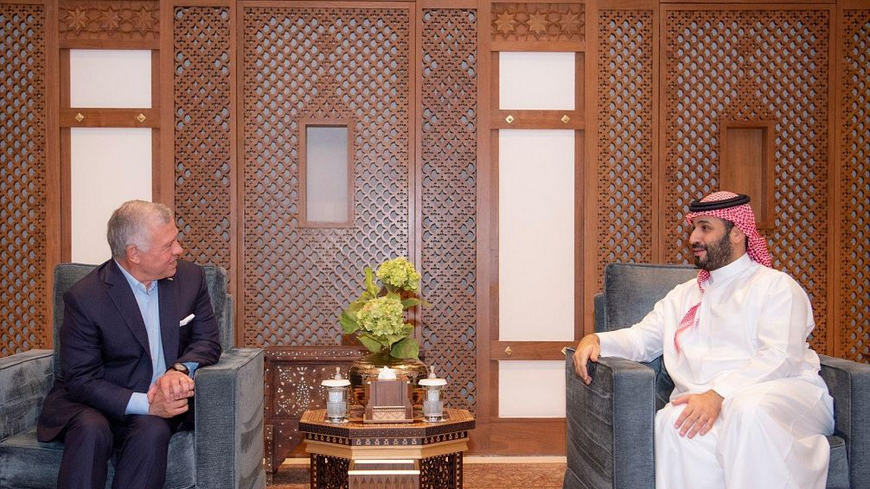DUBAI — Jordan’s King Abdullah II concluded a three-day trip Thursday to Saudi Arabia and the United Arab Emirates, where he met Saudi Crown Prince Mohammed Bin Salman in Jeddah and UAE President Mohamed bin Zayed. Arab normalization with Syria under President Bashar Al-Assad's government topped the agenda.
These trips followed last week’s meeting of Arab foreign ministers in Jeddah, where Jordan pushed to bring Syria back into the 22-member Arab League after being ousted in 2011. Though the gathering ended without a final decision, regional rapprochement with Syria has taken off in the last month. A diplomatic source told Al-Monitor that the Syrian normalization file tops Amman's Gulf diplomacy, following the peace plan that it announced last week.
Saudi Foreign Minister Prince Faisal bin Farhan visited Damascus this week in the first such trip for a top diplomat from the kingdom in over a decade. Assad was received in the UAE and Oman while Foreign Minister Faisal al-Mekdad visited Tunisia, Egypt and Saudi Arabia this month.
Merissa Khurma, director of Middle East programs at the Wilson Center, said Jordan has had a longstanding and strong relationship with both the UAE and Saudi Arabia and they share many mutual interests. The topic of Syria sits front and center for the country that shares its southernmost border as well as its refugee and drug-trafficking crisis.
“For Jordan, this is a national security issue,” Khurma told Al-Monitor, saying this is why coordinating and consulting with global and regional partners is critical, particularly on issues that affect Jordan and its Gulf allies.
There is a multi-billion-dollar black market for Captagon, which in recent years has been regionally manufactured along the Syrian-Lebanon border, according to the Washington-based Arab Center. The highly addictive substance travels through Jordan to reach Gulf Arab states, where it has been a drug of choice among disenfranchised youth, particularly in Saudi Arabia.
Jordan is also carrying the economic burden of Syrian refugees. Among the kingdom’s more than 11 million people are about 1.3 million Syrians, according to Jordan’s 2022 census data reported by the Brookings Institute. Only 17% of them live in the country’s two main refugee camps, Za’atari and Azraq.
On its western border, the longest border with Israel, Jordan faces an ongoing conflict that is of mutual interest for the UAE and Saudi Arabia to resolve.
“Israeli right-wing ministers have for decades, but primarily more recently, opposed Jordan’s stance on who Palestinians are,” said Khurma. In March, far-right Israeli Finance Minister Bezalel Smotrich denied the existence of the Palestinian people.
“This is an existential issue for Jordan,” she told Al-Monitor. “You cannot separate it from Jordan society or politics, both domestically and globally.”
In January, Israel’s national security minister Itamar Ben-Givr made a provocative visit to Al-Aqsa Mosque compound, also known as the Temple Mount, which falls under the guardianship of Jordan along with other Muslim and Christian sites as established after the 1967 War.
During the holy month of Ramadan in April, Israeli soldiers stormed the compound and arrested nearly 400 Palestinians.
“It absolutely shakes things up, because the relationships assigned by regional leaders are opposed by the majority of Arab populations, according to surveys and barometers we’ve seen,” said Khurma, adding that the Palestinian issue is at the heart of the matter. Jordan signed a peace agreement with Israel in 1994 but it considers the settlement of the Palestinian-Israeli conflict a priority for regional stability.
The king of Jordan’s meeting in Saudi Arabia comes immediately after Saudi Arabia's crown prince met with Palestinian President Mahmoud Abbas in Riyadh Wednesday.
Curtis Ryan, a professor of political acience at Appalachian State University, said the king's tour highlights how much Jordan values its relations with Gulf but also Western countries.
“Jordan is an aid-dependent country, and it therefore puts extensive effort into continually shoring up its relations with key allies from the UAE and Saudi Arabia to the United Kingdom and the United States," Ryan told Al-Monitor.
US aid has tripled over the past 15 years, according to a 2022 US congressional report, reaching $26.4 billion by 2020. In addition, Jordan and the United States signed a new deal last year committing to $1.45 billion annually for the next seven years.
He said Jordan was sidelined during the Donald Trump presidency from 2017 to 2021, which appeared to rely on personal relations with leaders in Israel, the UAE and Saudi Arabia.
This week’s trips and others, said Ryan, aim to strengthen Jordan’s position in the region with its allies along with its economic interests in aid, investment and trade.


f0eb.jpg)





